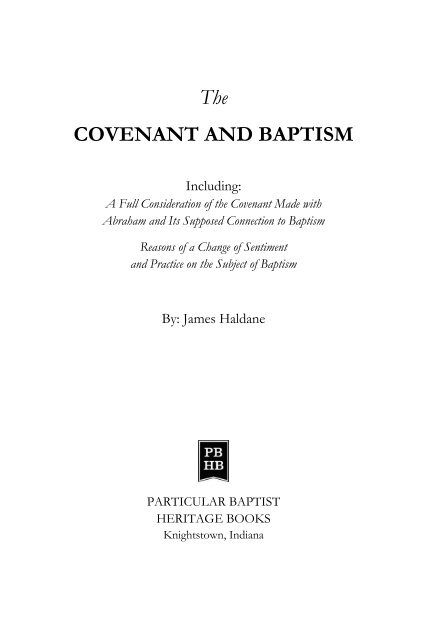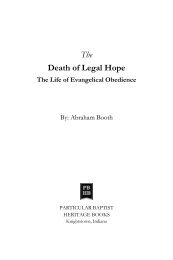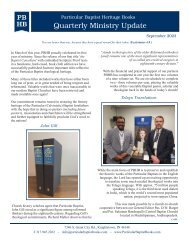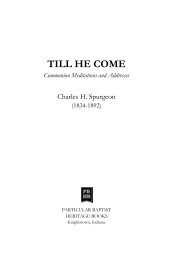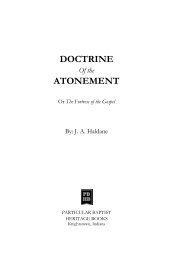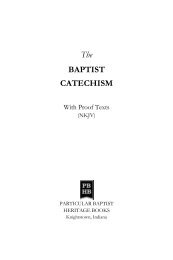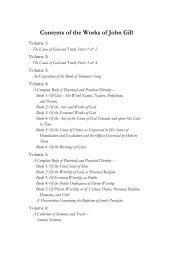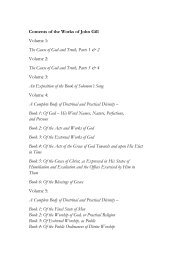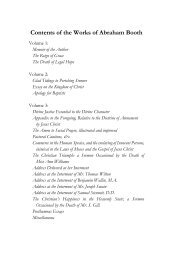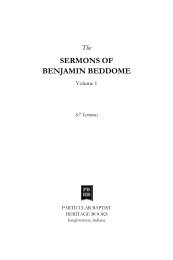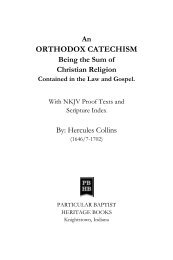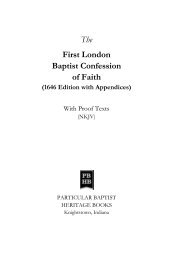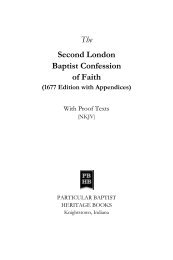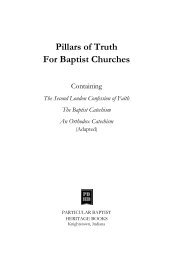Create successful ePaper yourself
Turn your PDF publications into a flip-book with our unique Google optimized e-Paper software.
The<br />
COVENANT AND BAPTISM<br />
Including:<br />
A Full Consideration of the Covenant Made with<br />
Abraham <strong>and</strong> Its Supposed Connection to Baptism<br />
Reasons of a Change of Sentiment<br />
<strong>and</strong> Practice on the Subject of Baptism<br />
By: James Haldane<br />
PARTICULAR BAPTIST<br />
HERITAGE BOOKS<br />
Knightstown, Indiana
The Covenant <strong>and</strong> Baptism<br />
By: James Haldane<br />
First Original Publication 1809<br />
First PBHB Edition 2023<br />
Particular Baptist Heritage Books<br />
7346 S. Grant City Rd.<br />
Knightstown, IN 46148<br />
email: info@particularbaptistbooks.com<br />
website: www.ParticularBaptistBooks.com<br />
PBHB is committed to recovering <strong>and</strong> preserving the<br />
literary heritage of Particular Baptists in an attractive,<br />
heirloom quality, hard-bound format.<br />
General Editor: D.W. Barger<br />
Copy Editor: A.J. Hammaker<br />
ISBN: 978-1-64127-034-2<br />
Book cloth – Hardcover<br />
Cataloging data:<br />
1. Haldane, James, 1768-1851.<br />
2. The Covenant <strong>and</strong> Baptism; general editor:<br />
D.W. Barger.<br />
3. Scottish Independents.<br />
4. Particular Baptists – United Kingdom.<br />
5. Abrahamic Covenant.<br />
6. Baptism – Infant Baptism.<br />
Printed <strong>and</strong> bound in the U.S.A by<br />
MissionBookmakers.com
Publisher’s Note<br />
It is hoped that our books will reintroduce many<br />
of today’s Calvinistic Baptists to the literary<br />
heritage of their notable <strong>and</strong> largely forgotten<br />
forefathers, the Particular Baptists.<br />
Their written works were both spiritually rooted<br />
<strong>and</strong> theologically driven. They offer not only<br />
penetrating insights into God’s Word, but also a<br />
deep spirit of devotion to Christ.<br />
Our team works hard to provide the reader with<br />
unabridged, word-for-word renditions of these<br />
valuable works in new <strong>and</strong> durable formats. This<br />
means keeping the original spellings, punctuations,<br />
<strong>and</strong> sentence structures of the originals even as we<br />
employ modern fonts <strong>and</strong> book binding<br />
techniques.<br />
For clarity, we also wish to inform our readers<br />
that our publishing of an author’s works does not<br />
necessarily entail a complete endorsement of every<br />
doctrinal point held by that author. Our goal is to<br />
give our readers access to Particular Baptist sources<br />
which will edify the Church <strong>and</strong> continue the work<br />
of Baptist historiography, not to stifle our heritage<br />
in the hope of strengthening present convictions.<br />
iii
The Covenant <strong>and</strong> Baptism<br />
Finally, among the many pressing needs of<br />
Calvinistic Baptist churches today is the need to<br />
identify, recover, <strong>and</strong> preserve their rich literary<br />
heritage.<br />
If you agree, there is a way for you to help. Our<br />
publishing ministry depends heavily upon financial<br />
partners eager to subsidize the cost of republishing<br />
these valuable works.<br />
Will you prayerfully consider becoming a<br />
publishing partner?<br />
To do so, visit our website:<br />
www.ParticularBaptistBooks.com<br />
iv
CONTENTS<br />
ORIGINAL INTRODUCTION ............................... 1<br />
1. Of the meaning of the word BAPTIZE ........... 17<br />
All critics assign to it the signification of immerse or<br />
plunge. Whether it is used in another sense in the<br />
New Testament? Acts 11:16 considered. Remarks<br />
on the proper <strong>and</strong> figurative meaning of words. The<br />
meaning ascertained by the universal practice of the<br />
Greek church, in which <strong>baptism</strong> <strong>and</strong> immersion are<br />
synonymous ― With this agrees the practice of the<br />
Latin church for 1300 years. ― Clinical aspersion,<br />
how introduced ― Sprinkling when introduced ―<br />
Practice of the church of Engl<strong>and</strong> ― Westminster<br />
Assembly. Meaning of the word further ascertained<br />
by the language employed in the New Testament.<br />
Objections answered, Ezek. 36:25; Heb. 11:10.<br />
2. Of the Subjects of Baptism ............................... 44<br />
Our Lord’s commission establishes the <strong>baptism</strong> of<br />
believers only. John’s <strong>baptism</strong> considered.<br />
Examples of <strong>baptism</strong> ― none but believers;<br />
households ― Lydia’s ― the jailor’s ― Stephanas ―<br />
Crispus. ― That only believers are the subjects of<br />
<strong>baptism</strong> appears from the import of the ordinance;<br />
represents, 1 st , Our fellowship with Christ in his<br />
death <strong>and</strong> resurrection, 2 nd , Our regeneration, 3 rd ,<br />
v
The Covenant <strong>and</strong> Baptism<br />
the remission of our sins, 4 th , Our separation to<br />
God. ― It is expressly called the profession of our<br />
faith. ― Objections answered, Matt. 19:13. 15; Acts<br />
2:38, 39, 3:25; Rom. 11:16; 1 Cor. 7:14; 1 Pet. 3:21.<br />
3. Of the Covenant with Abraham <strong>and</strong> it’s<br />
supposed connection with Baptism ..................... 85<br />
Evils arising from confounding the old <strong>and</strong> new<br />
<strong>covenant</strong>s. This the foundation of all Antichristian<br />
worship. No danger of the Apostles mistaking the<br />
meaning of the commission. No law of Moses more<br />
explicit. The sanctification of the Lord’s day st<strong>and</strong>s<br />
on very different grounds than infant <strong>baptism</strong>. The<br />
argument for infant <strong>baptism</strong> from the <strong>covenant</strong><br />
with Abraham, proceeds on a mistaken view of that<br />
<strong>covenant</strong> ― It is improperly called the <strong>covenant</strong> of<br />
grace ― was not the new <strong>covenant</strong> ― The original<br />
promise to Abraham ― Three distinct promises<br />
afterward given him. These had both a literal <strong>and</strong><br />
spiritual meaning ― This signified in what befell<br />
Isaac <strong>and</strong> Ishmael ― These promises peculiar to<br />
Abraham ― The children of believers not interested<br />
in the salvation of Christ till they believe, <strong>and</strong><br />
consequently are in this respect on a footing with<br />
others. God declared, even under the old <strong>covenant</strong>,<br />
that their descent alone would not profit them.<br />
Believers have great encouragement to train up their<br />
children in the fear of God ― What reason the<br />
Scripture gives us to expect spiritual blessings to be<br />
conveyed by birth ― Baptism never called the token<br />
vi
Contents<br />
of the new <strong>covenant</strong> ― The promises to children in<br />
the prophets considered ― Circumcision, what is<br />
meant ― The faith of Abraham not required in<br />
those who were circumcised. Servants when<br />
circumcised did not enjoy the privileges of Israel.<br />
Circumcision not appointed for believers who did<br />
not reside in Abraham’s family. The church of Israel<br />
was not the church of Christ ― Therefore all<br />
arguments from circumcision to <strong>baptism</strong><br />
inconclusive. The difference of the ordinances ―<br />
Some resemblance between them. The<br />
inconsistency of baptizing infants, <strong>and</strong> not<br />
acknowledging them church members ― Children,<br />
members of the church of Israel by birth ― An<br />
objection to this answered ― remarks on John 3 ―<br />
What signified by the casting out of Ishmael <strong>and</strong><br />
Esau. Reuben, Simeon, <strong>and</strong> Levi, retained in the<br />
family. Impropriety of those who practice infant<br />
<strong>baptism</strong> setting aside the eighth day. Intimations<br />
given by our Lord, that no external relation was to<br />
be acknowledged in his kingdom. Privileges of the<br />
people of God are not abridged ― If children<br />
baptized must be as the children of the new<br />
<strong>covenant</strong>. Those who try to prove infant <strong>baptism</strong><br />
from the Old Testament, follow the same course as<br />
those who maintain the propriety of an alliance<br />
between the church <strong>and</strong> the world.<br />
vii
The Covenant <strong>and</strong> Baptism<br />
4. The Arguments for Infant Baptism, Drawn from<br />
Ecclesiastical History, Briefly Noticed ............ 168<br />
The practice arose from mistaking the meaning of<br />
John 3:5 <strong>and</strong> considering <strong>baptism</strong> essential to<br />
salvation. Hermas ― Justin Martyr ― Tertullian the<br />
first who mentions infant <strong>baptism</strong>―opposes it ―<br />
Various abuses early introduced ― Godfathers,<br />
mentioned by Tertullian, made a profession of faith<br />
for the child ― Austin not baptized till he was 33 ―<br />
He ridicules the idea of infants being saved without<br />
<strong>baptism</strong> ― Gregory, Chrysostom ― The evidence<br />
from antiquity much against infant <strong>baptism</strong> ― The<br />
testimony of the fathers in matters of fact may be<br />
useful ― Disregard of the uniform voice of<br />
antiquity respecting the meaning of the word baptize.<br />
Conclusion .......................................................... 178<br />
Recapitulation―The practice of infant <strong>baptism</strong><br />
proceeds upon indirect evidence ― Every ordinance<br />
of Christ practical, but infant <strong>baptism</strong> of no<br />
practical use to the subjects. Practical use of<br />
<strong>baptism</strong> to a believer. Objection of our <strong>baptism</strong><br />
being different from that of the primitive Christians<br />
― Of employing ridicule of this question. No injury<br />
to the health to be apprehended ― connection<br />
between right views of the truth, <strong>and</strong> rightly<br />
observing the ordinances ― Apprehension of being<br />
thought changeable ― How those who are baptized<br />
should act.<br />
SCRIPTURE INDEX .......................................... 191<br />
viii
REASONS<br />
OF A<br />
CHANGE OF SENTIMENT<br />
AND PRACTICE<br />
ON THE<br />
SUBJECT OF BAPTISM<br />
CONTAINING A PLAIN VIEW OF THE SIGNIFICATION<br />
OF THE WORD, AND OF THE PERSONS FOR WHOM THE<br />
ORDINANCE IS APPOINTED;<br />
TOGETHER WITH<br />
A FULL CONSIDERATION<br />
OF THE<br />
COVENANT MADE WITH ABRAHAM<br />
AND ITS<br />
SUPPOSED CONNECTION WITH BAPTISM<br />
BY<br />
BY J.A. HALDANE<br />
THE SECOND EDITION, CORRECTED<br />
EDINBURGH,<br />
PRINTED BY J. RITCHIE<br />
SOLD BY A. BLACK, AND ALEX. JOHNSTONE,<br />
EDINGBURGH; J&A DUNCAN, GLASGOW; AND E.<br />
LESSLIE, DUNDEE<br />
1809
ORIGINAL<br />
INTRODUCTION<br />
In the following pages the writer has<br />
endeavored to state the Scripture doctrine<br />
respecting Baptism. He has seen cause to<br />
change his views of this ordinance, <strong>and</strong> has<br />
here given his reasons for his present practice.<br />
We are naturally inclined to speak of<br />
ourselves, <strong>and</strong> fondly imagine, that whatever<br />
respects us will excite attention. Experience<br />
tends to correct this notion, <strong>and</strong> to make us<br />
sensible that our history is less interesting to<br />
others than we are apt to suppose. But without<br />
forgetting this, or being justly chargeable with<br />
intruding ourselves on the public notice, we<br />
may sometimes be justified in referring to what<br />
has passed in our own minds; for as in water<br />
face answereth to face, so the heart of man to<br />
man. As the writer of these pages not only<br />
practiced for a considerable time what he now<br />
sees to be unscriptural, but also wrote in<br />
1
The Covenant <strong>and</strong> Baptism<br />
defense of infant <strong>baptism</strong>, 1 he trusts his<br />
brethren will bear with him while he relates the<br />
progress of his mind on this subject.<br />
The first time I thought at all on <strong>baptism</strong>, was<br />
in company with two ministers of the<br />
Establishment, when the name of a certain<br />
person was mentioned. I inquired, is he not an<br />
Anabaptist? One of them replied, he has much<br />
to say for himself on that subject, while the<br />
other was silent. I afterwards thought a good<br />
deal on this, although no more passed.<br />
Those with whom I then chiefly associated<br />
were of the Established church. I occasionally<br />
heard them speak of Baptists as people who<br />
were exceedingly keen on the subject, who had<br />
paid much attention to it, <strong>and</strong> had much to say<br />
upon it. At the same time, I observed a degree<br />
of hesitation among them respecting the<br />
ground on which infant <strong>baptism</strong> rested, <strong>and</strong><br />
that they generally evaded the question, by<br />
observing that circumcision availeth nothing<br />
nor uncircumcision, or by inquiring whether<br />
1 View of social Worship, &c. 1st <strong>and</strong> 2d editions.<br />
2
Original Introduction<br />
we should be more holy if plunged in water.<br />
One thing which tended much to keep me<br />
from examining the subject, was my being<br />
informed, that when people became Baptists,<br />
they not only lost all zeal for the spread of the<br />
gospel but were in a great measure shut out<br />
from usefulness. I had also imbibed a thorough<br />
contempt for bigotry, or in other words, for<br />
attention to any part of the order established<br />
by Jesus Christ in his churches, <strong>and</strong><br />
consequently my conscience was in a great<br />
measure seared against conviction on the<br />
subject.<br />
With these views I began to preach,<br />
endeavoring to call the attention of my fellow<br />
men to the doctrine of salvation by grace<br />
through faith. I had not at that time any<br />
underst<strong>and</strong>ing of the nature of church<br />
fellowship, or of the importance of purity of<br />
communion. Imagining, that our only concern<br />
when at the Lord’s table was with the state of<br />
our own hearts, I considered it unnecessary to<br />
think of others, <strong>and</strong> therefore without any<br />
reluctance I attended the sacrament, <strong>and</strong> joined<br />
3
The Covenant <strong>and</strong> Baptism<br />
with many who I was sensible were altogether<br />
ignorant of God. I thought indeed that purity<br />
of communion would be agreeable, but that, as<br />
we did not know the heart, it could not be<br />
attained, <strong>and</strong> at all events, I had no idea of<br />
risking general usefulness by attending to<br />
external matters.<br />
Without either examination or prayer on the<br />
subject, I took it for granted that the apostles<br />
had left everything respecting church order to<br />
our discretion. I admitted there were indeed<br />
certain outlines which they had drawn; but<br />
what these were, <strong>and</strong> how far they extended, I<br />
did not know, <strong>and</strong> I might add, did not care.<br />
Such were my views when the church<br />
meeting in the Circus in Edinburgh was<br />
formed. I then, however, thought with<br />
pleasure, that I had an opportunity of attaining<br />
purity of communion, without sacrificing<br />
usefulness, having a large congregation to<br />
whom I might preach the gospel, while only<br />
those who appeared believers were admitted<br />
into the church.<br />
This gradually led me to attend to the order<br />
4
Original Introduction<br />
appointed for the churches in the word of<br />
God. We had no st<strong>and</strong>ard of human<br />
composition, <strong>and</strong> therefore our appeal was<br />
made to the Scriptures alone, <strong>and</strong> one thing<br />
after another respecting the kingdom of Christ<br />
came into view.<br />
In such circumstances, I could not wholly<br />
overlook the subject of <strong>baptism</strong>, but was still<br />
under strong prejudices against it. Indeed the<br />
further I seemed likely to depart from my<br />
former principles, the more jealous was I, lest I<br />
should go the same length as those whom I had<br />
always heard called narrow-minded bigots. I<br />
held in general, that <strong>baptism</strong> came in the room<br />
of circumcision, <strong>and</strong> satisfied my mind without<br />
further inquiry.<br />
*** THIS SECTION REMOVED FOR<br />
<strong>SAMPLE</strong> ***<br />
5
CHAPTER 1<br />
On the Meaning of the word BAPTIZE<br />
THE Lord after his resurrection, comm<strong>and</strong>ed<br />
his disciples to preach repentance <strong>and</strong><br />
remission of sins to all nations, beginning at<br />
Jerusalem. They were also to baptize the<br />
disciples. This is admitted on all h<strong>and</strong>s; but the<br />
question is, what are we to underst<strong>and</strong> by the<br />
term baptize?<br />
It is a Greek word, which has not been<br />
translated in many modern versions, probably<br />
in imitation of the Vulgate, where it is also<br />
retained. The question must therefore be<br />
resolved by examining the meaning of the<br />
word, both in Greek authors <strong>and</strong> in the<br />
Scriptures. Fortunately, there are few questions<br />
of this kind on which we can obtain more<br />
satisfactory evidence. Every Dictionary of<br />
character assigns the signification of immerse or<br />
plunge to the word baptize. I believe no critic of<br />
any name can be produced who does not<br />
consider this to be the proper meaning of the<br />
6
Chapter 1: On the Meaning of the Word BAPTIZE<br />
word. And their testimony deserves the greater<br />
credit, as in general they had every temptation<br />
to represent it as signifying sprinkling, to<br />
vindicate their own practice.<br />
But it is said, that it is sometimes used in the<br />
New Testament in another sense. We read of<br />
baptizing with the Holy Ghost. Of this <strong>baptism</strong><br />
we have an instance in the case of Cornelius<br />
<strong>and</strong> his friends. “While Peter was speaking to<br />
them, the Holy Ghost fell on all them that heard<br />
the word. And they of the circumcision were<br />
astonished ― because that on the Gentiles also<br />
was poured out the gift of the Holy Ghost,”<br />
Acts 10:44. 45. This reminded Peter of the<br />
word of the Lord, how he said, “John indeed<br />
baptized with water, but ye shall be baptized<br />
with the Holy Ghost,” chap.11:16.<br />
This is the chief passage which is alleged to<br />
prove, that to baptize sometimes signifies to<br />
pour out. But let it be observed, that although<br />
it could be shown, that baptize has a secondary<br />
or figurative meaning, this will not at all affect<br />
the primary <strong>and</strong> proper signification. It is<br />
generally admitted, that the primary<br />
7
The Covenant <strong>and</strong> Baptism<br />
signification of a word is always to be retained,<br />
unless we are restricted to its secondary or<br />
figurative meaning by the connection. When<br />
Christ comm<strong>and</strong>ed his disciples to baptize, we<br />
surely have no reason to suppose, that the<br />
word should not be understood in its original<br />
<strong>and</strong> primary signification. Had he intended<br />
them to practice pouring or sprinkling, or merely<br />
washing, there were words appropriated to each<br />
of these meanings; but when they are<br />
comm<strong>and</strong>ed to baptize, the word must surely be<br />
understood in its natural <strong>and</strong> primary sense.<br />
The Socinians <strong>and</strong> Universalists argue against<br />
the divinity of Jesus precisely in the same way<br />
as those who deny that <strong>baptism</strong> means<br />
immersion. They produce instances, where the<br />
name of God is applied in a figurative or<br />
improper sense to creatures. Hence, they<br />
allege, that Jesus being called God, does not<br />
prove his supreme divinity. As to the duration<br />
of the punishment of the wicked, they maintain<br />
that αιων, eternal, sometimes means a limited<br />
duration: thus, we read of the everlasting hills;<br />
<strong>and</strong> hence they affirm, that the punishment of<br />
the wicked is not eternal.<br />
8
Chapter 1: On the Meaning of the Word BAPTIZE<br />
To this it is replied, that the words have a true<br />
<strong>and</strong> primary meaning, in which they are always<br />
to be understood, unless the scope of the<br />
passage necessarily limits us to the secondary<br />
or improper signification.<br />
If this principle be given up, the greatest<br />
confusion will be introduced into everything<br />
that is spoken or written. Words are used as<br />
signs to express our ideas; <strong>and</strong> to prevent the<br />
unnecessary multiplication of these signs, the<br />
same word is used in different senses, which<br />
are all connected with, <strong>and</strong> spring from the<br />
original meaning of the word. Thus, the<br />
English word dip, according to Dr. Johnson,<br />
signifies, 1. to immerse, to put into any liquor;<br />
2. to moisten, to wet; 3. to be engaged in any<br />
affair; 4. to engage as a pledge.<br />
These different meanings arise out of the<br />
first, <strong>and</strong> we find no difficulty in underst<strong>and</strong>ing<br />
the word in its various applications. But what<br />
should we think of a person who maintained,<br />
that a comm<strong>and</strong>ment to dip anything signified<br />
merely to wet or moisten it, or to engage it as a<br />
pledge; <strong>and</strong> produced Dr. Johnson’s authority<br />
9
The Covenant <strong>and</strong> Baptism<br />
for this interpretation?<br />
This would be precisely the same kind of<br />
argument that is used by those who affirm, that<br />
as persons are said to be baptized by the Holy<br />
Ghost on whom he is poured out, therefore the<br />
comm<strong>and</strong>ment to baptize the disciples in all<br />
nations, signifies to pour water on them. With<br />
the same propriety we might endeavor to<br />
describe the manner in which the apostles fished<br />
from what we know of their preaching, for the<br />
Lord promised to make them fishers of men,<br />
Mark 1:17.<br />
*** THIS SECTION REMOVED FOR<br />
<strong>SAMPLE</strong> ***<br />
10
CHAPTER 2<br />
Of the Subjects of Baptism<br />
When the Lord rose from the dead, he<br />
appeared repeatedly to his disciples during the<br />
course of forty days, speaking to them of the<br />
things pertaining to the kingdom of God.<br />
Before he ascended up on high, he delivered to<br />
his eleven apostles their commission in these<br />
words: “All power is given unto me in heaven<br />
<strong>and</strong> in earth. Go ye therefore, <strong>and</strong> teach all<br />
nations, baptizing them in the name of the<br />
Father, <strong>and</strong> of the Son, <strong>and</strong> of the Holy Ghost;<br />
teaching them to observe all things whatsoever<br />
I have comm<strong>and</strong>ed you: <strong>and</strong> lo I am with you<br />
alway, even unto the end of the world,”<br />
Matt. 28:18. 20.<br />
There are two words in this commission<br />
which are both rendered teach. The former is<br />
μαθητευσατε literally make disciples. Men can be<br />
made disciples of Jesus only by hearing <strong>and</strong><br />
believing the gospel. In this manner, therefore,<br />
they were to make disciples from all nations.<br />
11
The Covenant <strong>and</strong> Baptism<br />
They were also to baptize the disciples in, or<br />
into (εις) the name of the Father, &c; that is,<br />
into the faith of the one Jehovah, who has thus<br />
revealed himself in Jesus Christ. Having<br />
baptized the disciples, they were to teach them<br />
to observe all things whatsoever he had<br />
comm<strong>and</strong>ed them. Accordingly, they<br />
proceeded exactly in this way. They preached<br />
salvation through the blood of Jesus, baptized<br />
those who believed, <strong>and</strong> taught them to<br />
observe the ordinances, Acts 18:7, 8; 1 Cor.<br />
11:2.<br />
The commission, as recorded by Mark,<br />
exactly agrees with this. “And he said unto<br />
them, Go ye into all the world, <strong>and</strong> preach the<br />
gospel to every creature. He that believeth, <strong>and</strong><br />
is baptized, shall be saved; <strong>and</strong> he that believeth<br />
not shall be damned,” Mark 16:15, 16. Nothing<br />
can be clearer <strong>and</strong> more precise than this. The<br />
gospel was to be preached to all, <strong>and</strong><br />
whosoever believed it was to be baptized.<br />
So far, all Christians are pretty well agreed;<br />
but it is alleged, that not only believers, but<br />
their children, should be baptized. We shall<br />
12
Chapter 2: On the Subjects of Baptism<br />
therefore inquire, what we are taught in the<br />
word of God on this subject. We shall be able<br />
to do this with greater advantage, because we<br />
have frequent accounts of the manner in which<br />
the apostles fulfilled their commission. Indeed,<br />
more is said in the New Testament of <strong>baptism</strong>,<br />
than of any other ordinance.<br />
There were divers <strong>baptism</strong>s under the old<br />
<strong>covenant</strong>, Heb. 9:10 such as Lev. 11:32, 14:8,<br />
15:5; Num. 31:23, see also Mark 7:4. But these<br />
were occasional, <strong>and</strong> intended to remove<br />
ceremonial uncleanness, <strong>and</strong> were<br />
consequently entirely different from the<br />
ordinance of Jesus, which is only to observed<br />
once by his people.<br />
When considering the subject of <strong>baptism</strong>,<br />
our attention is naturally led to the ministry of<br />
John the Baptist. “John did baptize in the<br />
wilderness, <strong>and</strong> preach the <strong>baptism</strong> of<br />
repentance, for the remission of sins. And<br />
there went out unto him all the l<strong>and</strong> of Judea,<br />
<strong>and</strong> they of Jerusalem, <strong>and</strong> were all baptized of<br />
him in the river of Jordan, confessing their sins.<br />
And John was clothed with camel’s hair, <strong>and</strong><br />
13
The Covenant <strong>and</strong> Baptism<br />
with a girdle of a skin about his loins: <strong>and</strong> he<br />
did eat locusts <strong>and</strong> wild honey: <strong>and</strong> preached,<br />
saying, there cometh one mightier than I after<br />
me, the latchet of whose shoes I am not worthy<br />
to stoop down <strong>and</strong> unloose. I indeed have<br />
baptized you with water: but he shall baptize<br />
you with the Holy Ghost,” Mark 1:4,―8.―<br />
“Then said Paul, John verily baptized with the<br />
<strong>baptism</strong> of repentance, saying unto the people,<br />
That they should believe on him which should<br />
come after him, that is, on Christ Jesus,” Acts<br />
19:4. Compare Matt. 3, Luke 3, <strong>and</strong> John 1.<br />
Hence, we learn, 1 st , That John proclaimed<br />
that the kingdom of God was at h<strong>and</strong>: that he<br />
was the forerunner of Messiah: <strong>and</strong> that, when<br />
he appeared, all confidence in fleshly descent<br />
would be vain, Matt. 3:9.<br />
2d, Those who believed his doctrine<br />
confessed their sins, professed repentance, <strong>and</strong><br />
were baptized, Luke 7:29, 30.<br />
3d, Jesus himself was baptized before<br />
entering on his public work; thus,<br />
acknowledging the truth of John’s doctrine,<br />
<strong>and</strong> setting an example of obedience to the<br />
14
Chapter 2: On the Subjects of Baptism<br />
comm<strong>and</strong>ments of God who had sent John to<br />
baptize, John 1:33.<br />
*** THIS SECTION REMOVED FOR<br />
<strong>SAMPLE</strong> ***<br />
15
CHAPTER 3<br />
Of the Covenant with Abraham,<br />
<strong>and</strong> it’s Supposed Connection with Baptism<br />
To those who consider the relation in which<br />
the Old <strong>and</strong> New Testaments st<strong>and</strong> to each<br />
other, who reflect on the comparative darkness<br />
of the one, <strong>and</strong> the plainness of speech used in<br />
the other, it may well appear surprising, that<br />
any disciple of Jesus should think of going back<br />
to the Old Testament to know his will on the<br />
subject of so important an ordinance as<br />
<strong>baptism</strong>. It deserves the serious consideration<br />
of all who do so, that most of the errors into<br />
which the first Christians fell, sprang from the<br />
same source, <strong>and</strong> that a considerable part of the<br />
apostolic epistles is intended to show the error<br />
of confounding the old <strong>and</strong> new dispensations.<br />
Acts 15; Galatians throughout; Phil. 1:15,―18<br />
<strong>and</strong> 3; Col. 2:10. 20,―23; 1 Tim. 1:4,―9.<br />
Hebrews throughout.<br />
They would also do well to consider, that<br />
almost all the corruptions of Christianity, <strong>and</strong><br />
16
Chapter 3: Of the Covenant with Abraham,<br />
<strong>and</strong> its Supposed Connection with Baptism<br />
the reign of antichrist, have proceeded from<br />
the same cause. “While the Roman emperors<br />
continued heathens, the man of sin made slow<br />
progress; but no sooner was he who letted taken<br />
out of the way, 2 Thess. 2:7 <strong>and</strong> Christianity<br />
taken under the protection of the sovereign,<br />
then an unnatural connection was formed<br />
between church <strong>and</strong> state, which subsists to the<br />
present day in every country of Europe.<br />
Now, what is this but a recurrence to the<br />
weak <strong>and</strong> beggarly elements under which the<br />
church was placed in its minority? And by what<br />
arguments drawn from Scripture can it be<br />
vindicated, but the example of Israel of old?<br />
What is all the pomp <strong>and</strong> ceremony which have<br />
been introduced into religion, but an imitation<br />
of the sanctuary worship? What are the splendid<br />
edifices, but imitations of the Jewish temple? What<br />
are all the ecclesiastical dignities which are so<br />
highly prized, but an imitation of the institution<br />
of the Jewish priesthood?<br />
To this we must also trace the robes whereby<br />
the clergy are distinguished, together with the<br />
titles they have assumed. What is the distinction<br />
17
The Covenant <strong>and</strong> Baptism<br />
between clergy <strong>and</strong> laity, but a copy of the<br />
separation of the Levites from their brethren?<br />
On what does their claim of receiving tithes rest,<br />
but the example of Israel? Whence do they<br />
arrogate to themselves the exclusive right of<br />
dispensing ordinances, <strong>and</strong> endeavor to trace their<br />
genealogy as the successors of the apostles, but<br />
because it was unlawful for any but the priests,<br />
the successors of Aaron, to offer sacrifice or<br />
burn incense? Whence do they assume the<br />
name of priests, seeing the office is exclusively<br />
held by the Son of God, as is shown at large in<br />
the epistle to the Hebrews? What are the<br />
festivals of Lent <strong>and</strong> Easter, &c. but an imitation<br />
of those appointed by Moses? In short, it will<br />
be found that the whole system of antichristian<br />
worship is founded on the Jewish law, which<br />
was fulfilled <strong>and</strong> abrogated by Christ.<br />
Let the instructions delivered by the apostles<br />
in the epistle to the Galatians, &c. be<br />
understood <strong>and</strong> acted upon, <strong>and</strong> it will destroy<br />
the very foundation of antichristian<br />
worship.”―We ought then to be very cautious<br />
how we endeavor to prove any of the<br />
ordinances of the kingdom of Christ from the<br />
18
Chapter 3: Of the Covenant with Abraham,<br />
<strong>and</strong> its Supposed Connection with Baptism<br />
Old Testament, <strong>and</strong> still more so how we add<br />
to the words of Jesus by baptizing children,<br />
while he has only comm<strong>and</strong>ed the disciples, or<br />
those who believe, to be baptized, Matt. 28:19;<br />
Mark 16:15, 16.<br />
But it is said, we must consider how the<br />
apostles, to whom the commission was<br />
originally delivered, would underst<strong>and</strong> it. From<br />
their habits, it is thought they would take it for<br />
granted, that children were to be baptized with<br />
their parents, <strong>and</strong> therefore a particular precept<br />
was not necessary. This assumption is<br />
gratuitous. After the day of Pentecost, the<br />
apostles were no more guided by their former<br />
habits, which had so often misled them. They<br />
had learned that the kingdom of God, the laws<br />
of which they were to publish, was very<br />
different from the worldly kingdom established<br />
in Israel. 2 The subjects of the latter enjoyed that<br />
privilege by birth; the subjects of the former<br />
2 See Col. 2:20 where the apostle calls the kingdom of<br />
Israel the world. It is so called as contrasted with the<br />
kingdom of God. When no such contrast is made, it is<br />
called the kingdom of God. Matt. 21:43 for he was the<br />
King of the nation of Israel under the theocracy.<br />
19
The Covenant <strong>and</strong> Baptism<br />
were born, not of blood, nor of the will of the<br />
flesh, nor of the will of man, but of God, John<br />
1:13. The apostles were taught by the death <strong>and</strong><br />
resurrection of Christ, 3 to acknowledge no man<br />
after the flesh, i.e. to make no account of<br />
anything external as bringing persons into<br />
relation with God,<br />
2 Cor. 5:15, 16 <strong>and</strong> therefore they could never<br />
underst<strong>and</strong> that children should be baptized on<br />
account of the faith of their parents.<br />
But there was no danger of the apostles<br />
misunderst<strong>and</strong>ing our Lord, however<br />
obscurely he had intimated his will; for they<br />
were infallibly guided in their practice by his<br />
Spirit. The precision of the words of the<br />
commission, therefore, was not so much for<br />
their sake as for ours. The kingdom of God<br />
was to be published to many nations of very<br />
different ideas <strong>and</strong> habits, who were not to be<br />
infallibly secured from error. It was therefore<br />
3 They had formerly expected Christ to come for the<br />
salvation of Israel, but now they had learned the extent<br />
of his atonement, John 11:52; 1 John 2:2 <strong>and</strong> this had<br />
destroyed all their former prejudices respecting carnal<br />
descent.<br />
20
Chapter 3: Of the Covenant with Abraham,<br />
<strong>and</strong> its Supposed Connection with Baptism<br />
of the greatest consequence that the will of<br />
Jesus respecting <strong>baptism</strong> should, on their<br />
account, be very explicitly declared; <strong>and</strong> we<br />
have already seen that this is the case. There is<br />
not one of the laws of Moses more<br />
indisputable in its plain <strong>and</strong> obvious meaning,<br />
<strong>and</strong> we have seen that there are other<br />
satisfactory proofs, that those who baptize<br />
believers alone, do not misunderst<strong>and</strong> it.<br />
*** THIS SECTION REMOVED FOR<br />
<strong>SAMPLE</strong> ***<br />
21
CHAPTER 4<br />
The Arguments for Infant Baptism, Drawn<br />
from Ecclesiastical History, Briefly Noticed.<br />
Having considered the principal arguments<br />
for infant <strong>baptism</strong> drawn from Scripture, I<br />
might well be excused from referring to the<br />
practice of the first ages, as it is generally<br />
known that many corruptions were very early<br />
introduced. It is to be feared, however, that<br />
many satisfy their consciences with the<br />
consideration, that although the arguments<br />
from Scripture are not conclusive, yet the early<br />
practice of infant <strong>baptism</strong> is sufficient to<br />
establish the point.<br />
I shall be happy if the following remarks lead<br />
any to examine this subject, convinced, that on<br />
an impartial examination, it will appear, that the<br />
<strong>baptism</strong> of infants took its rise from its being<br />
considered absolutely necessary to salvation.<br />
Infant <strong>baptism</strong> seems to have arisen from the<br />
declaration of the Lord, “Except a man be<br />
22
Chapter 4: The Arguments for Infant Baptism, Drawn<br />
from Ecclesiastical History, Briefly Noticed<br />
born of water <strong>and</strong> of the Spirit, he cannot enter<br />
into the kingdom of God,” John 3:5. So full<br />
were the fathers of the notion that this passage<br />
proved <strong>baptism</strong> to be indispensably necessary<br />
to salvation, that Wall 1 mentions one (Hermas)<br />
whom he supposes to have written before the<br />
death of the apostle John, who maintains that<br />
the apostles, after their death, descended unto<br />
Hades, <strong>and</strong> baptized the patriarchs, prophets,<br />
&c. Hermas says nothing, however, of the<br />
<strong>baptism</strong> of infants. Justin Martyr, who lived<br />
about the year one hundred <strong>and</strong> forty, is the<br />
first who is supposed to allude to infant<br />
<strong>baptism</strong>. “We have received,” says he, “not the<br />
carnal, but spiritual circumcision.” But surely<br />
the spiritual circumcision is not the <strong>baptism</strong><br />
with water.<br />
Again, he observes, “Several persons of both<br />
sexes among us, sixty <strong>and</strong> seventy years old,<br />
who were discipled to Christ from their<br />
1 History of Infant-<strong>baptism</strong>. This author is abundantly<br />
zealous on the subject, but his work is not calculated to<br />
give satisfaction to those who wish to find a warrant for<br />
this practice. See also Gale’s Reflections on Wall’s<br />
History.<br />
23
The Covenant <strong>and</strong> Baptism<br />
childhood, do continue uncorrupted.” But<br />
what has this to do with infant <strong>baptism</strong>? As<br />
soon as a child becomes a disciple of Christ’s,<br />
let him be baptized. Indeed, although<br />
Pedobaptist writers refer to Justin on this<br />
subject, none of them consider his testimony<br />
of great importance, <strong>and</strong> some of them entirely<br />
give it up. That he knew nothing of infant<br />
<strong>baptism</strong>, appears from his giving a minute<br />
description of the manner in which <strong>baptism</strong><br />
was observed, <strong>and</strong> he makes no allusion to<br />
children, but particularly mentions believers as<br />
the subjects of the ordinance.<br />
This he does in his Apology addressed to the<br />
Roman Emperor, where he gives an account of<br />
the Christian faith <strong>and</strong> worship. Now surely, if<br />
he was faithful, he could not have omitted<br />
mentioning so important a part of the Christian<br />
practice as infant <strong>baptism</strong>, had it been then<br />
introduced.<br />
Irenaeus, who flourished about the year one<br />
hundred <strong>and</strong> eighty-four, says, “Christ passed<br />
through all the ages of man, that he might save<br />
all by himself; that is all who by him are<br />
24
Chapter 4: The Arguments for Infant Baptism, Drawn<br />
from Ecclesiastical History, Briefly Noticed<br />
regenerated to God, infants, <strong>and</strong> little ones, <strong>and</strong><br />
children, <strong>and</strong> youths, <strong>and</strong> persons advanced in<br />
age.” This will be readily granted; but here is<br />
nothing about baptizing infants. It is true, that<br />
<strong>baptism</strong> very early got the name of<br />
regeneration, <strong>and</strong> upon this the argument from<br />
this passage is founded. But if being<br />
regenerated here means being baptized, it must<br />
refer to those who were baptized by Jesus<br />
Christ personally.<br />
Tertullian, who lived about the year two<br />
hundred, is the first who mentions infant <strong>baptism</strong>,<br />
<strong>and</strong> he argues against it, which he surely would<br />
not have done, if he had considered it to be a<br />
comm<strong>and</strong>ment of Christ. 1 After his days it<br />
seems gradually to have gained ground, <strong>and</strong> in<br />
Cyprian’s time, (A.D. 250.) a council of 66<br />
bishops determined that it was not necessary to<br />
delay it till the eighth day. This is, of itself, a<br />
1 Even Wall admits, that he probably knew nothing of<br />
an apostolic tradition for infant <strong>baptism</strong>, else he would<br />
not have opposed it. Some passages from Origen are<br />
quoted in favor of infant <strong>baptism</strong>: but it is generally<br />
admitted, that his works are so interpolated by his Latin<br />
translator, that we cannot distinguish what is genuine<br />
from what is spurious.<br />
25
The Covenant <strong>and</strong> Baptism<br />
very suspicious circumstance. Had it been<br />
h<strong>and</strong>ed down from the apostles, there would<br />
have been no need of the authority of a council<br />
to enact its observance; but this was the<br />
common way of introducing any unscriptural<br />
practice.<br />
It is said, that there is no accounting for it<br />
becoming so universal, had it been an<br />
innovation; that at least we must have read of<br />
much opposition to it. But how were many<br />
other corruptions silently introduced so early?<br />
How came so many idle ceremonies to be<br />
adopted, such as tasting milk <strong>and</strong> honey on<br />
coming out of the water, anointing with<br />
ointment, &c? How came bishops so soon to<br />
obtain so great power? And how came infant<br />
participation of the Lord’s supper to be<br />
introduced? Cyprian mentions this as expressly<br />
as he does infant <strong>baptism</strong>, <strong>and</strong> to this day it is<br />
practiced in the Greek church.<br />
*** THIS SECTION REMOVED FOR<br />
<strong>SAMPLE</strong> ***<br />
26
CONCLUSION<br />
I have thus endeavored to state the doctrine<br />
of Scripture respecting <strong>baptism</strong>, <strong>and</strong> have<br />
considered particularly the argument in favor<br />
of infant <strong>baptism</strong> from the <strong>covenant</strong> made with<br />
Abraham. I trust it will appear, that on this, as<br />
on other subjects, the word of God is a lamp<br />
to our feet, <strong>and</strong> a light to our paths.<br />
We have seen, that the signification of the<br />
word baptize, is established by the most<br />
undoubted evidence; that there is no difference<br />
respecting it among the best scholars; that its<br />
meaning is ascertained by the practice of the<br />
Greek church, <strong>and</strong> by the uniform testimony<br />
of antiquity, by the allusions made to <strong>baptism</strong><br />
in the New Testament, <strong>and</strong> by all the language<br />
there used concerning it. So that we have fuller<br />
evidence on this subject than on many others,<br />
which few are disposed to dispute.<br />
*** THIS SECTION REMOVED FOR<br />
<strong>SAMPLE</strong> ***<br />
27
SCRIPTURE INDEX<br />
Genesis<br />
3:15 .......................... 102<br />
12:1,―3 ................... 101<br />
12:3 ......... 100, 122, 126<br />
12:7 .......................... 102<br />
13:14. 17 ................. 102<br />
14:20, 28:22 .............. 91<br />
15 ............................. 102<br />
15:3, 6 ...................... 103<br />
15:9, 10 ..................... 99<br />
17 ............................. 114<br />
17:4 .......................... 103<br />
17:5 .......................... 103<br />
17:7 ........... 97, 103, 124<br />
17:8 .......................... 103<br />
17:9-14 .................... 134<br />
17:10. 23 ................... 99<br />
17:11 ........................ 138<br />
17:12 ........................ 139<br />
17:13 ........................ 141<br />
17:20 ................ 104, 117<br />
21:12 ................ 104, 118<br />
21:13 ........................ 118<br />
22:16. 18 ................. 101<br />
22:18 ........................ 122<br />
25:1. 4 ...................... 104<br />
27:10, 11 ........................<br />
Exodus<br />
2:24, 25 .................... 104<br />
4:22 .......................... 111<br />
4:24. 26 .................... 147<br />
6:6, 7 ........................ 104<br />
12:48 ........................ 141<br />
18:1. 12 .................... 147<br />
19:4,―6 .................... 105<br />
29:21 .......................... 25<br />
Leviticus<br />
6:27, 16:14. ............... 25<br />
11:32, 14:8, 15:5 ....... 46<br />
23:10. 17 .................... 78<br />
25:39. 46 .................. 144<br />
Numbers<br />
12:1, 6,―8 ............... 137<br />
12:6,―8 .................... 137<br />
15:20, 21 .................... 78<br />
20:12 ........................ 158<br />
20:14 ........................ 158<br />
23:10 ....................... 104<br />
31:23 .......................... 46
Scripture Index<br />
*** THIS<br />
SECTION<br />
REMOVED FOR<br />
<strong>SAMPLE</strong> ***<br />
29
30


